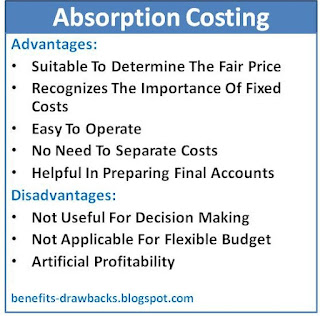Benefits Or Advantages Of Absorption Costing System
The main advantages of absorption costing system can be studied as follows:
1. Fair Pricing
Absorption costing covers both variable costs and fixed costs while determining the cost of unit of a product. So, it is suitable method to determine the fair price of product and services.
2. Importance Of Fixed Cost
Absorption costing system recognizes the importance of fixed manufacturing costs and treats them as product cost.
3. Easy To Operate
Absorption costing system of product costing is simple method which can be installed and operate easily without any complication. It consumes less time and costs to operate.
4. Accurate Profitability
Absorption costing system helps to determine accurate profitability in the case of seasonal production and sales.
Also Read:
5. No Separation Of Costs
6. Preparing Final Accounts
Absorption costing helps to prepare income statement and final account of the company.
Drawbacks Or Disadvantages Of Absorption Costing
Main disadvantages of absorption costing system can be expressed as follows:
1. Not Suitable For Decision Making
Absorption costing does not provide detailed information about fixed and variable costs. Therefore, it may not be useful for management for planning and decision making purpose.
2. Not Suitable For Flexible Budget
Flexible budget cannot be prepared with the help of absorption costing because it does not make distinction between fixed and variable costs.
3. Artificial Profitability
In absorption costing, more profit can be shown by moving fixed manufacturing costs from income statement. It misleads the users.





